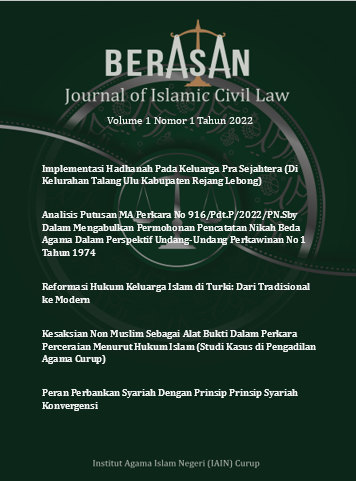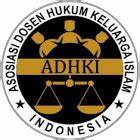Implementasi Hadhanah Pada Keluarga Pra Sejahtera (Di Kelurahan Talang Ulu Kabupaten Rejang Lebong)
DOI:
https://doi.org/10.29240/berasan.v1i1.4706Keywords:
Implementation, Hadhanah, Pre Prosperous FamilyAbstract
The role of hadhanah is very important in a family, especially underprivileged families who are in the spotlight of researchers. However, based on facts on the ground, it shows that pre-prosperous families have not implemented hadhanah properly. Therefore, further research is needed to find out how the understanding of underprivileged families in Talang Ulu Village, Rejang Lebong Regency about hadhanah, how to implement hadhanah in underprivileged families in Talang Ulu Village, Rejang Lebong Regency. This type of research is a qualitative field research. The data sources in this study are primary data sources, secondary data sources and tertiary data sources. The data collection techniques of this research were observation, interviews and documentation. The results showed that understanding of hadhanah by pre-prosperous families was quite good, as seen from the results of the study which showed that understanding of
hadhanah is an obligation of both parents, and if it is not implemented, it includes people who sin for wasting their children, will plunge the child on things that can damage the child's religion. The implementation of hadhanah in underprivileged families in Talang Ulu Village, Rejang Lebong Regency has not been implemented properly, it can be seen that parents let their children leave the house at sunset, let their children leave the five daily prayers on purpose, and do not supervise children's interactions which results in children who pregnant out of wedlock and must marry underage. Parents and families should set an example from themselves for their children, if parents do good things it will be an example and role model for children and become a good habit for the child.
Downloads
References
Abdul Rahman Ghazaly. Fiqh Munakahat. Prenada Media, 2019.
Abdullah, Abdul Gani. Pengantar Kompilasi hukum Islam dalam tata hukum Indonesia. Gema Insani, 1994.
Abu Abdullah Muhammad bin Ismail al-Bukhari. “Shahih al-Bukhari, Bab Ciri-Ciri Iblis dan Bala Tentaranya, No 3280. h. 767,†t.t.
Abu Dawud Sulaiman bin al-Asy’ats al-Azdi as-Sijistani. “Ensiklopedia Hadits 5; Sunan Abu Dawud, (Al-Mu’jam 20,21) Bab Akikah (at-Tuhfah21), No 2837. h. 598,†t.t.
———. “Ensiklopedia Hadits 5; Sunan Abu Dawud, (Al-Mu’jam 26) Bab Kapan Anak-Anak Mulai Diperintahkan Sholat (at-Tuhfah 25), No 495. h. 103,†t.t.
Agusniatih, Andi, dan Jane M. Manopa. Keterampilan Sosisal Anak Usia Dini: : Teori dan Metode Pengembangan. Edu Publisher, 2019.
Akhun, Nafan. Al Quran Terjemah Depag PDF Interactive v201905. Nafan Akhun, 2019.
Arifin, Zainal. “Pelaksanaan Eksekusi Hadhonah Bagi Pasangan Yang Bercerai Di Pengadilan Agama Curup Tahun 2016.†Al-Istinbath : Jurnal Hukum Islam 3, no. 1 (29 Juni 2018): 23. https://doi.org/10.29240/jhi.v3i1.367.
Aziz, Syaikh Sa’ad Yusuf Mahmud Abu. Ensiklopedi Hak dan Kewajiban Dalam Islam. Pustaka Al-Kautsar, t.t.
Cahyani, Tinuk Dwi. Hukum Perkawinan. UMMPress, 2020.
Lc, Vivi Kurniawati. Pengasuhan Anak. Lentera Islam, t.t.
“Levi Winanda Putri - 210117075 - HKI.pdf.†Diakses 15 Desember 2021. http://etheses.iainponorogo.ac.id/14373/2/Levi%20Winanda%20Putri%20-%20210117075%20-%20HKI.pdf.
Lirboyo, Purnasiswa 2015 MHM. Fathul Qorib Mini II. Aghitsna Publiser, t.t.
“Mery Risqi Damayanti_20160702010045_BAB I_HKI.pdf.pdf.†Diakses 20 Desember 2021. http://etheses.iainmadura.ac.id/877/6/Mery%20Risqi%20Damayanti_20160702010045_BAB%20I_HKI.pdf.pdf.
Mira Ramayani, dkk,: Implementasi Hadhanah Pada Keluarga Pra Sejahtera
Berasan: Journal of Islamic Civil Law, Vol. 1, No.1, 2022.
Asnawi, Natsir, Pengantar Jurimetri dan Penerapannya Dalam Penyelesaian Perkara Perdata: Pendekatan Kuantitatif dan Kualitatif Terhadap Hukum. Prenada Media, 2020.
Nurrohmi, Diah Ardian. “Tinjauan Yuridis Pelaksanaan Putusan Pengadilan Agama Mengenai Tanggungjawab Ayah Terhadap Biaya Pemeliharaan Anak (Hadhanah) Setelah Perceraian (Studi Kasus Putusan Pengadilan Agama Boyolali No. 923/Pdt.G/2007/PA.Bi),†no. 923 (t.t.): 138.
“Penyelesaian Sengketa Hadhanah Menurut Perspektif Fiqih dan Kompilasi Hukum Islam.†Diakses 24 Desember 2021. https://123dok.com/document/7q015pvz-penyelesaian-sengketa-hadhanah-menurut-perspektif-fiqih-kompilasi-hukum.html.
Qurthubi, Syaikh Imam Al-. Tafsir Al-Qurthubi. Pustaka Azzam, 2007.
“Subhan Arif.†Diakses 24 Desember 2021. http://etheses.uin-malang.ac.id/22456/1/17781029.pdf.
“Undang-undang Republik Indonesia Nomor 1 Tahun 1974 tentang Perkawinan,†t.t., 15.
Yustisia, Tim Visi, dan Visimedia Pustaka. Konsolidsai Undang-Undang Perlindungan Anak: UU RI No. 23/2002 & UU RI No. 35/2014. VisiMedia, 2016.
Zuhaili, Prof Dr Wahbah az-. Fiqih Islam wa Adilatuhu Jilid 10: Hak-Hak Anak; Wasiat; Wakaf; Warisan. Gema Insani, 2021.
Downloads
Published
Issue
Section
Citation Check
License
Authors who publish with Berasan: Journal of Islamic Civil Law agree to the following terms:
- Authors retain copyright and grant the journal right of first publication with the work simultaneously licensed under a Creative Commons Attribution-NonCommercial-ShareAlike 4.0 International License (CC BY-NC-SA 4.0) that allows others to share the work with an acknowledgment of the work's authorship and initial publication in this journal.
- Authors are able to enter into separate, additional contractual arrangements for the non-exclusive distribution of the journal's published version of the work (e.g., post it to an institutional repository or publish it in a book), with an acknowledgment of its initial publication in this journal.
- Authors are permitted and encouraged to post their work online (e.g., in institutional repositories or on their website) prior to and during the submission process, as it can lead to productive exchanges, as well as earlier and greater citation of published work (See The Effect of Open Access).









